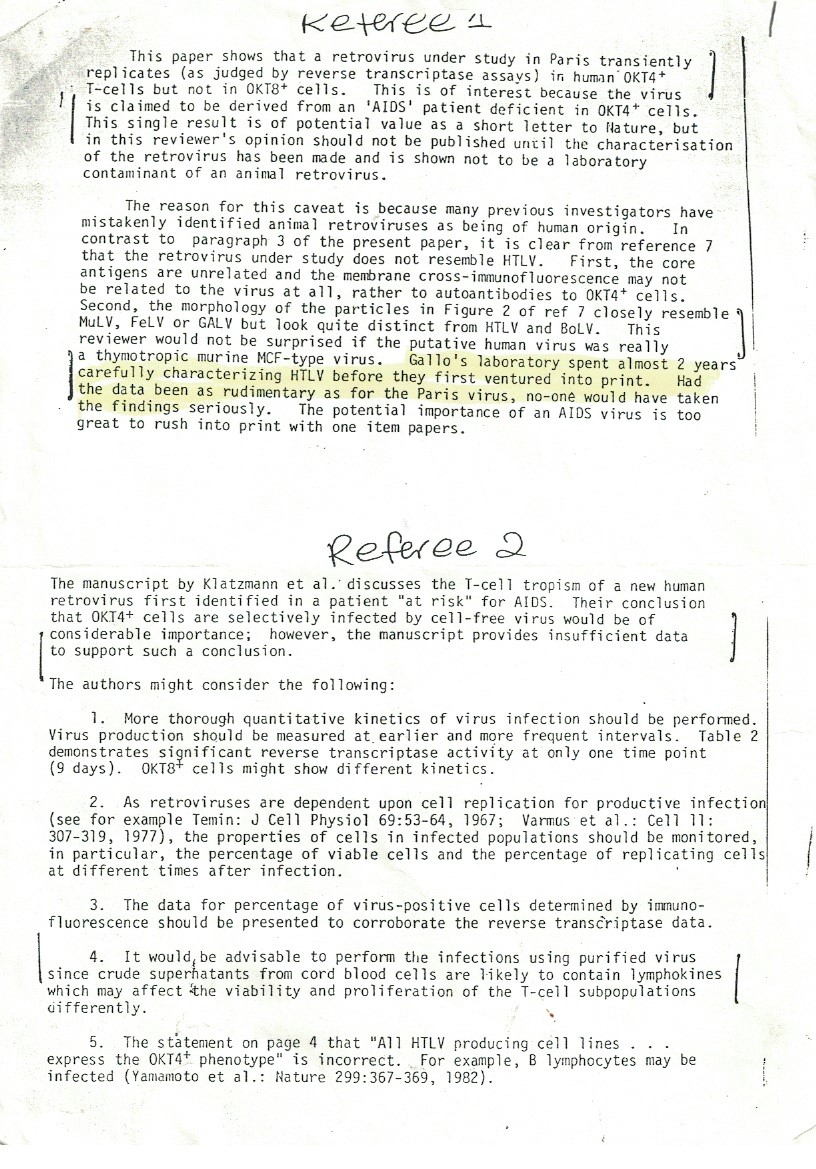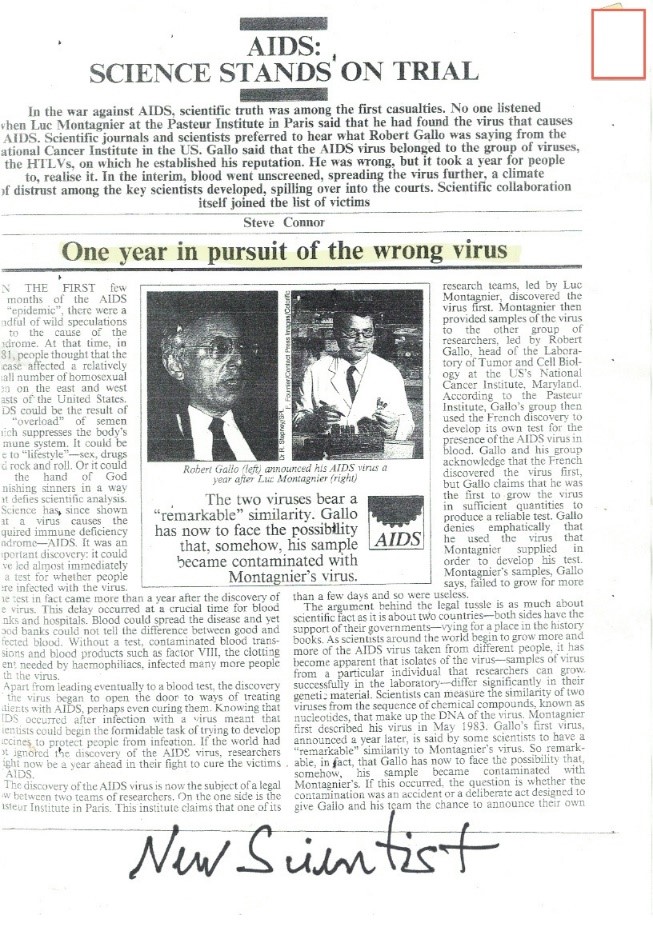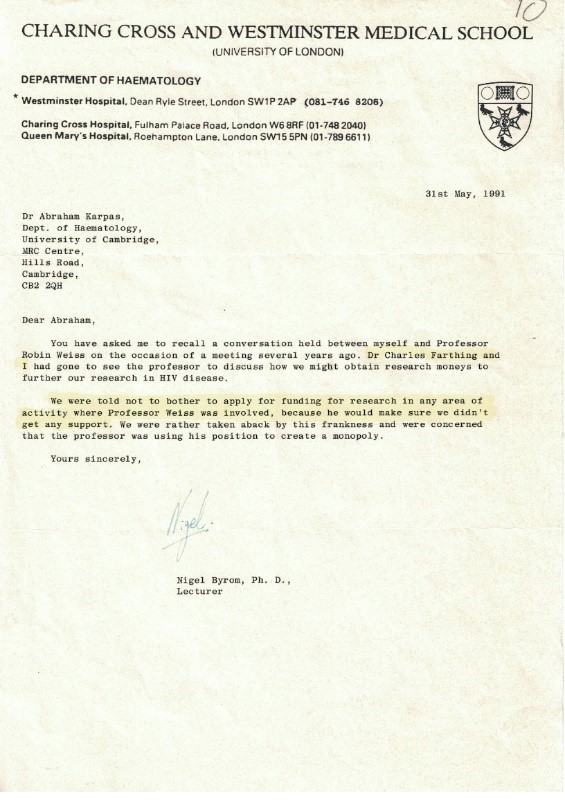Emerging Infectious Diseases and Diagnosis Journal
Review Article
How the 1983 Seminal French Manuscript with the Evidence that their HIV was the Cause of Aids was Deliberately Blocked, Resulting in Hundreds of Thousands of Infections and Deaths Worldwide
Karpas A*
(ex) Department of Haematology, Cambridge University Clinical School, United Kingdom
*Corresponding author: Abraham Karpas, 19 Wilberforce road, Cambridge, CB3 0EQ, United Kingdom, Tel: +441223364801; Email: ak10001@cam.ac.uk or karpasa@hotmail.com
Citation: Karpas A (2019) How the 1983 Seminal French Manuscript with the Evidence that their HIV Was the Cause of Aids was Deliberately Blocked, Resulting in Hundreds of Thousands of Infections and Deaths Worldwide. Emerg Infect Dis Diag J: EIDDJ-100003.
Received date: 25 August, 2019; Accepted date: 30 August, 2019; Published date: 03 September, 2019
Abstract
After AIDS was recognised as a new human disease in 1981 it became obvious that a transmissible agent was involved in its rapid spread. In May 1983 the American Journal Science published a paper by French scientists claiming that they had isolated a new retrovirus from an AIDS patient which they named LAV. In the same issue of the journal two papers from Dr Robert Gallo’s laboratory claimed that the human retrovirus responsible for adult T-cell leukaemia, HTLV, is connected with the development of AIDS.
By then the French team had compelling evidence that their LAV was a new virus, belonging to the lentivirus subgroup of retroviruses, and put forward an explanation of how AIDS developed, by the killing of CD4+T-cells. They submitted their manuscript to the British Journal Nature, but unfortunately it appears that Dr Robin Weiss’ laboratory was allowed to provide both reports of what were supposed to be two independent referees. The paper was delayed for several months and then rejected on this ‘referee’s advice’.
This allowed Gallo to keep publishing papers about the involvement of HTLV in AIDS until 1984, wasting a full year of AIDS research. Eventually Gallo's laboratory did succeed in identifying the real cause of AIDS - but only after receiving LAV from Paris which was renamed HTLV-3. Likewise, Weiss also succeeded in growing HIV in 1984 - but only after receiving LAV from Paris which he renamed CBL-1. Subsequent studies discovered a remarkable characteristic of the virus, namely, that each independent isolate of HIV has a unique sequence. Once this was established it became obvious that both Gallo's HTLV-3 and Weiss CBL-1 were the very same LAV isolates they received from Paris.
Blocking the seminal French manuscript also enabled Weiss to plagiarise Klatzmann's 1983 evidence that HIV is cytopathic to the CD4+T-cells. However, by far the most important damage that Weiss caused by blocking the 1983 French paper was to delay the development and introduction of a screening test, which could have been used to prevent the spread of infection during the 'lost year' and saved hundreds of thousands from AIDS.
Keywords: AIDS; HIV; HTLV; Plagiarism Weiss
Introduction
AIDS was recognised as a new human disease by Gotlieb and associates in 1981 [1] when it was suspected of being caused by a transmissible microorganism. In May 1983 Dr Luc Montagnier’s team from the Pasteur Institute in Paris published a paper in the American Journal Science by [2] that they had isolated a new retrovirus from an AIDS patient to which they gave the name LAV (Lymphadenopathy Associated Virus). In the same issue of Science Dr Robert Gallo, an eminent American scientist from the National Institutes of Health (NIH) of the USA claimed that HTLV (Human T-cell Leukaemia Virus [3], a retrovirus previously known to be involved in the development of Adult T-Cell leukaemia (ATL) was the cause of AIDS. Gallo's group also had a second paper in the same issue of the journal in support of this claim [4].
In another paper Montagnier's laboratory at the Pasteur Institute collaborated with the medical immunologist Dr David Klatzmann from La Pitie-Salpetriere hospital in Paris and submitted a second major research manuscript to the British Journal Nature in May 1983. The manuscript gave compelling evidence that their new retrovirus LAV (for Lymphadenopathy Associated Virus) was indeed involved in the development of AIDS and provided an explanation of the mechanism. It showed that this virus preferentially killed the CD4+T-cells essential for the body's immune defence responses and thus caused the immune deficiency diagnostic of the disease. There were excellent electron micrographs in the manuscript, revealing LAV/HIV to have a distinctive bullet-shaped core whose morphology was characteristic of the lentivirus subgroup of retroviruses whereas the round-shaped core seen in HTLV is characteristic of the C-type oncovirus subgroup.
At that time the competing claim, strongly championed by Gallo, was that the causative agent of AIDS was HTLV. This was contradicted by both epidemiology and pathology [9]. Morphologically HTLV belongs to the oncovirus subgroup of retroviruses. Cells infected with oncoviruses either appear morphologically and biologically unchanged or become cancerous. HTLV is endemic in south west Japan, with perhaps a million people infected; in south west Japan 26% of the adult population has been reported to carry the virus, yet no case of AIDS has occurred [5]. 99% of the HTLV-infected individuals remain unaffected by the virus while 1% develops Adult T-cell Leukaemia (ATL), many years after infection [6]. HTLV increases the number of T cells by malignant transformation, AIDS does the opposite, dramatically reducing T cell numbers by killing them. The genome of HTLV is very stable. When Karim Malik sequenced the genome of HTLV that I isolated from a black ATL patient from London in 1983, he was able to establish that it differed only by 2.3% from the sequence of the Japanese HTLV [7]. In contrast, as will be mentioned again later, the sequence of the AIDS virus isolates is very variable [8].
The French manuscript provided convincing evidence that LAV/HIV was new; it reported the first lentivirus to infect man; and it explained why AIDS developed this, at a time when AIDS was spreading rapidly and bizarre explanations flourished, such as God's punishment of the homosexuals, a virus created by the CIA or, according to some Russian accounts, a consequence of capitalism. It was a particularly important paper that should have been published without delay. Not with standing, as Montagnier told me, they heard nothing from the office of Nature for several months until the paper was eventually rejected following unfavourable comments from the referees. Montagnier gave me a copy of the referees’ rejections (Figure 1), indicating that he suspected they came from the laboratory of Dr Robin Weiss.
Weiss was known to have supported Gallo's claims that HTLV was the cause of AIDS and had himself published a major research article in Nature with Gallo about the isolation of a human retrovirus HL23 virus [10], which proved to be laboratory contamination with several monkey viruses, [11,12]. He regularly commented for Nature’s News and Views on retroviruses; and, as it appears, had effective control of the publication of papers, providing referees for the biological subeditor of Nature at that time, Peter Newmark. Even without reading the text of Nature's two referees’ reports I was struck by the similarity of the typewriters, so I had the reports examined professionally. I was told that both had been typed by a Royal typewriter, which apparently was used in Weiss' laboratory at the time. Weiss vehemently denied ever having seen the French paper when I challenged him outright in 1990 through the journalist Lorn Macintyre who published a front page article about it in The Glasgow Herald on 30 January 1990. However later Dr John Maddox, the chief editor of Nature, on being questioned by John Crewdson the Pulitzer Prize winner journalist who published the book Science Fictions [13] on the background to the discovery of HIV confirmed that Dr Weiss had indeed been the referee responsible for the rejections. And, as Crewdson recently wrote to me, “Weiss himself admitted (to Crewdson) that he “might have been” one of the referees for that paper”. Apparently Dr Maddox dismissed Peter Newmark, the biological sub-editor of Nature, for allowing Weiss to provide both referees’ reports.
In support of Gallo's claim for HTLV, Weiss blocked publication of the French paper. As can be seen in Referee 1 (Figure 1) he wrote: "Gallo's laboratory spent almost 2 years carefully characterizing HTLV before they ventured into print, had the data been as rudimentary as for the Paris virus, no-one would have taken the finding seriously". Rejection of the French manuscript significantly delayed its evidence becoming generally known, sufficiently for the journal New Scientist later to publish a major article entitled “AIDS: Science Stands On Trial One Year in Pursuit of the Wrong Virus" (Figure 2) [14]. In that article Gallo is blamed for the lost year, but Weiss’ role was in truth pivotal.
Gallo's laboratory did eventually succeed in growing a genuine AIDS virus in 1984 but only after receiving LAV twice from Paris, which Gallo published in Science in 1984 [15], claiming to have discovered the cause of AIDS. At this time Science also published the Klatzmann et al 1983 Nature manuscript previously blocked by Weiss [16]. Gallo was unwilling to admit his earlier mistake, so he named 'his' so-called new virus HTLV-3 [15], as if HIV was a variant of the ATL leukaemia virus.Weiss then wrote in Nature, repeating his 1983 comments (Figure 1).
“Montagnier's group in the Institut Pasteur in France which published first but with skimpy data and Gallo's group at NCI, which delayed submission until a thorough characterisation of their virus and repeated isolation from different patients had been accomplished" [17]. The 'skimpy' data' of the French team were rewarded by a Nobel Prize in Medicine to Francoise-Barre Sinoussi and Luc Montagnier in 2006.
Later detailed molecular studies of the sequences of independent isolates of HIV uncovered a remarkable fact: the virus is so variable that each independent isolate of the virus is distinct from any other, varying in sequence by as much as 10% [8] each isolate of HIV has its own distinctive 'fingerprint'. It was rapidly found that Gallo's so-called HTLV-3 virus and the “multiple isolations” credited to him by Weiss were the very same single virus isolates his laboratory had received twice from the Pasteur Institute in 1983 - sent to him in a spirit of collaboration -appropriated and renamed [13].
In 1984 Weiss sent one of his collaborators to Paris to collect the French virus and to learn how to grow it, as Montagnier told me in a letter. After receiving the French virus, Weiss claimed to have independently isolated a new strain to which he gave the designation CBL-1. He then licensed CBL-1 virus to the Wellcome Diagnostics company for them to start developing a test for the diagnosis of HIV infection through detection of antibodies to the virus. By that time there was already in existence an ELISA test for antibodies to HIV produced by the US company Abbott Laboratories, approved by the FDA and introduced into many countries besides the USA. Unfortunately, it did not receive approval for use in the UK for another six months. I learned about the delay from an article in the New Scientist of 8 August 1985 [18] "Ministers Delay Launch of AIDS Test" which claims the delay was to give time for Wellcome Diagnostics to develop a similar ELISA test with Weiss' CBL-1 virus. Although the article does not mention who advised the ministry in this regard, I know from personal experience that Dr Phillip Mortimer was the head of the virus laboratory of the Department of Health and Social Security (DHSS) and in charge of the evaluations and decision as to which test to use and when to start testing for HIV. Weiss and his associate Dr Richard Tedder were helping Welcome Diagnostics develop their independent ELISA test with Weiss' CBL-1 virus. Dr Mortimer must have agreed to delay the approval of the Abbott test out of friendship with Weiss and Tedder. As a result, many more individuals must have become infected in the UK with HIV during the 6 months’ delay while Mortimer was waiting for Wellcome Diagnostic to complete the development of their ELISA. The Abbott test was approved for use in the UK only after Wellcome Diagnostics developed their own test.
As it turned out, the story of CBL-1 mirrored that of HTLV-3. Once full nucleic acid sequences were obtained, they showed that CBL-1 was also a gift from Paris [19].
David Klatzmann, in a letter to me, stated that Weiss visited him in Paris in 1984. On learning of Klatzmann’s studies showing the receptor for HIV on the surface of T lymphocytes to be the CD4 antigen, Weiss said he had made similar findings. He gave no evidence for this but offered to deliver Klatzmann's paper to Nature to publish alongside his own alleged results. As Nature's principal referee on retroviruses he could apparently do so. But publication was delayed, conveniently, for some months - allowing Klatzmann's work to be reproduced in Weiss' laboratory. It seems that Weiss was also able to decide the apparent dates of submission of manuscripts, since both Weiss' paper and Klatzmann's have an identical “date of submission" 18 October 1984 [20, 21]. Thus Weiss became "co-discoverer" of the CD4 cellular receptor for HIV.
This sort of behaviour is not the only example of Weiss' unscrupulous attitude toward others. In May 1991 Dr Nigel Byrom, a lecturer in the haematology department at Charing Cross and Westminster Medical School, wrote me the following " Dr Charles Farthing and I had gone to see the professor to discuss how we might obtain research money to further our research in HIV disease. We were told not to bother to apply for funding for research in any area of activity where Professor Weiss was involved, because he would make sure we did not get any support" (Figure 3).
What is most reprehensible about the whole story is not the academic dishonesty but the far more important consequences outside the academic field: the HIV infection of hundreds of thousands of individuals during the 'lost year', thanks to the blocking of a seminal paper in 1983 (by Weiss) and the licence it gave Gallo until 1984 [22] to continue sowing confusion among researchers throughout the world with his insistence on HTLV.
If AIDS research had been productively employed from 1983 a diagnostic test for HIV could have started development in 1983; and many infections and deaths could have been avoided. Klatzmann recently wrote to me: "I do agree that if this paper had been published in the summer of 1983, as it should have this would have changed the way the scientific community would have looked at LAV (HIV) as the causal agent of AIDS!".
Estimating how many additional people might have avoided infection, had a test been ready, is speculative and subject to contestable assumptions. AIDS is of course only the end-stage of a long progressive destruction of the immune system with people remaining apparently healthy for many years, so especially in the early years of the epidemic a great many more were infected than the numbers of AIDS reports would suggest. But an impression can perhaps be gained from these facts: AIDS cases in the US increased 10-fold between 1983 and 1986, 5-fold in Europe between 1984 and 1986, doubled world-wide between 1985 and 1986 and nearly doubled again between 1986 and 1987 according to WHO. In 1987 the WHO estimated that world-wide, 5-10 million people were infected with the virus.
Postscript
After the definitive story of HIV discovery had become known the outcome was very different for the two principals. Recognition of Gallo's egregious dishonesty obliged him to leave the National Institutes of Health of the USA. By contrast in the UK no hint of Weiss' nefarious actions ruffled his steady progress. Though having delayed the introduction of HIV testing in the UK to allow time for a British test will have led to further avoidable HIV infections in the UK, he was awarded the Queen's Award to industry, the Ernest Chain Prize and a fellowship in the Royal Society.

Figure 1: Rejection slips received from Nature by Montagnier. Both appeared typed on the same machine. Weiss admitted to Crewdson he 'might have been one of the referees’.

Figure 2: Article from the New Scientist on the 'Lost Year'.

Figure 3: Letter describing Byrom’s experience of Weiss’ ruthlessness.
Citation: Karpas A (2019) How the 1983 Seminal French Manuscript with the Evidence that their HIV Was the Cause of Aids was Deliberately Blocked, Resulting in Hundreds of Thousands of Infections and Deaths Worldwide. Emerg Infect Dis Diag J: EIDDJ-100003.